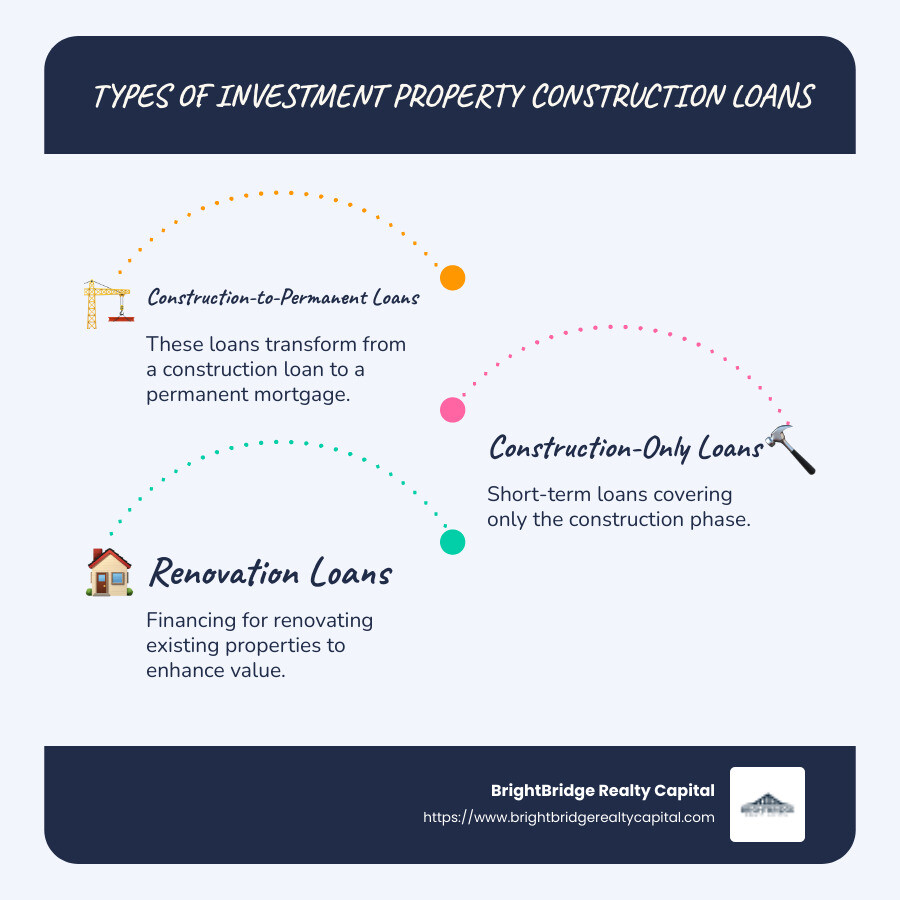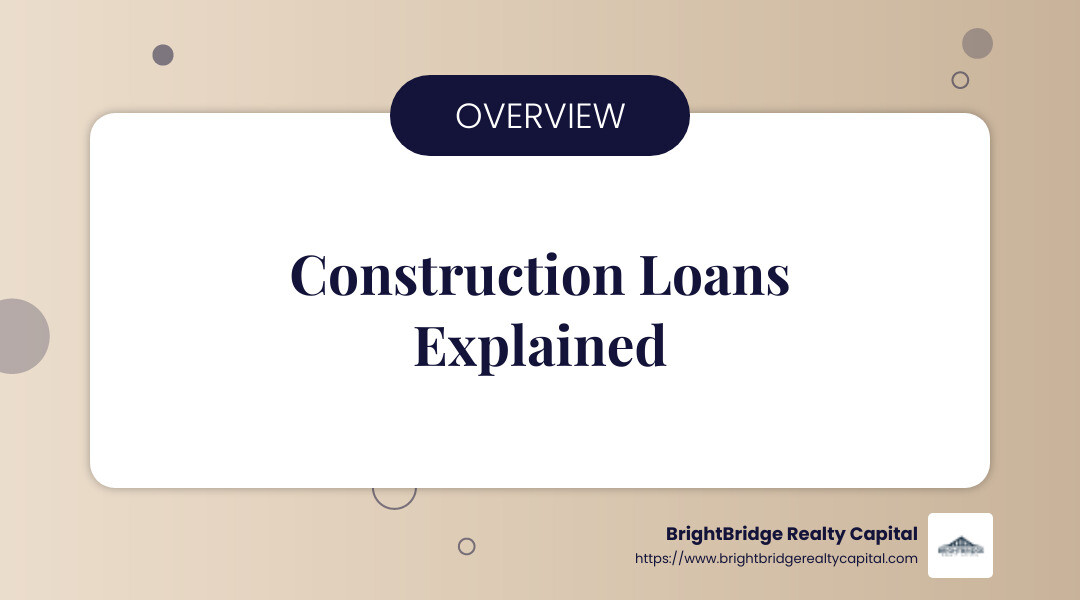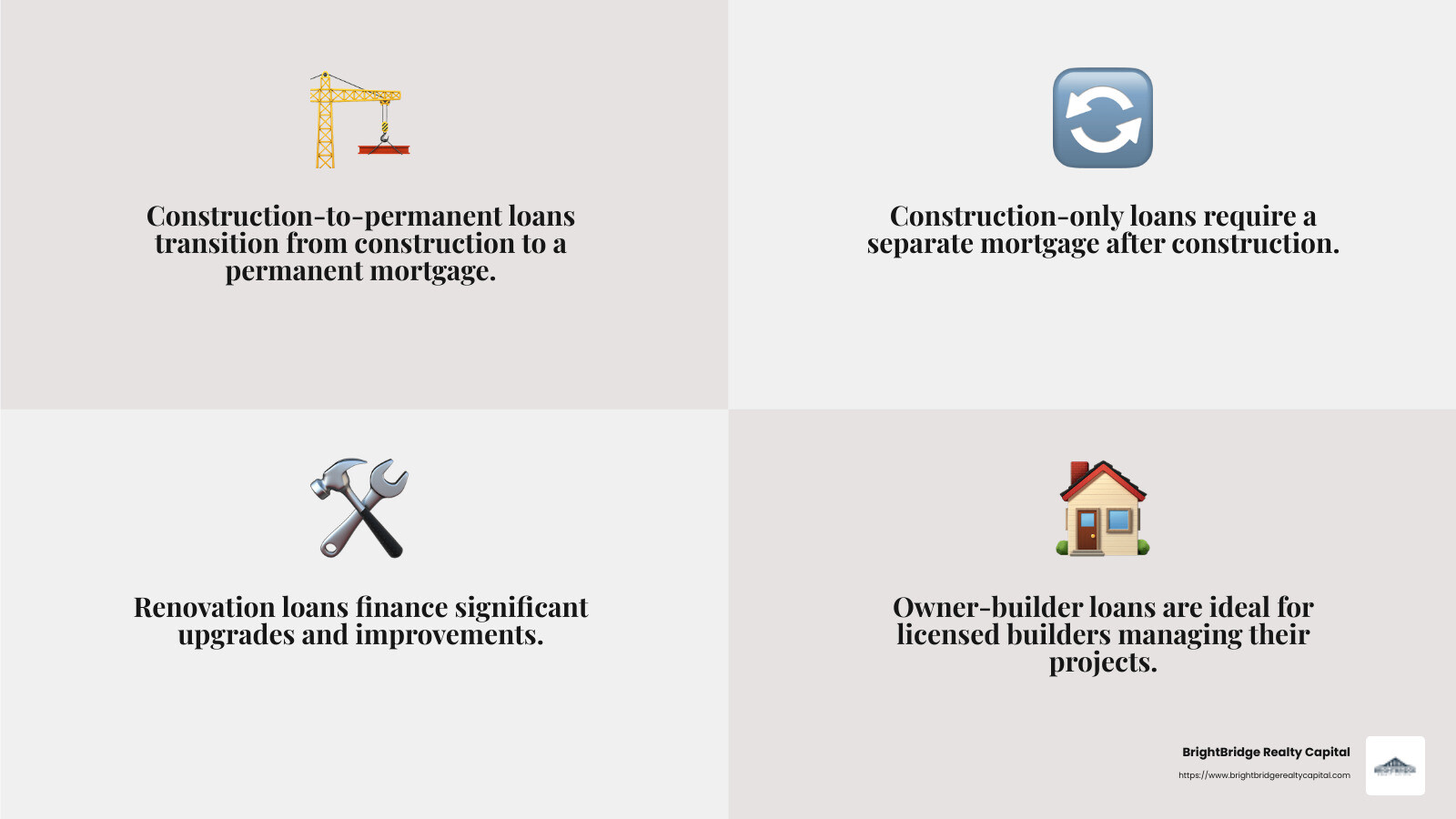Laying the Foundation: How to Get a Construction Loan for Your Investment Property

An investment property construction loan is a smart choice for real estate investors looking to build or renovate properties. This type of loan not only covers the costs associated with construction but also offers flexibility custom to the specific needs of developers. Whether you're upgrading an existing property or starting fresh with new construction, these loans provide the financial support necessary to create spaces that maximize investment potential.
Key Points:
- Purpose: Used for building new properties or renovating existing ones.
- Funding: Covers construction costs, often distributed in phases.
- Options: Includes construction-to-permanent and construction-only loans.
These loans are perfect for investors frustrated by the slow loan processes and high rates, as they offer a unique chance to quickly and efficiently improve their real estate portfolios.
Real estate ventures come with unique challenges, and selecting the right financing is crucial to ensuring success. With so many financing options available, understanding construction loans is essential for those aiming to capitalize on lucrative opportunities in the property market. This article will guide you through various elements and types of construction loans, helping you make informed decisions.

Investment property construction loan word roundup:
Understanding Construction Loans
Construction loans are a popular choice for investors looking to build or renovate properties. These are short-term financing options designed to cover the costs associated with building new structures or making significant upgrades to existing ones. Let's break it down:
Short-Term Financing
Unlike traditional mortgages, construction loans are typically short-term, often lasting just a year. This timeframe aligns with the construction or renovation schedule, providing the necessary funds to complete the project. Once the construction is finished, many investors transition to a more permanent financing option, like a mortgage.
Building Costs
Construction loans are specifically designed to cover the various costs involved in building a property. This includes expenses for purchasing raw materials, hiring contractors, and even obtaining necessary permits. The loan is usually disbursed in phases, known as "draws," which are tied to the completion of specific project milestones. For instance, a draw might be released once the foundation is poured or the framing is complete. This structure ensures that funds are used appropriately and helps manage the project's cash flow.
Renovation Projects
For those looking to upgrade existing properties, construction loans can also be applied to extensive renovation projects. Whether you're adding a new room, updating a kitchen, or making structural improvements, these loans can provide the financial backing needed to improve property value. Renovation loans are a subset of construction loans, custom to projects that transform or improve existing spaces rather than starting from scratch.

In summary, investment property construction loans offer a flexible and efficient way to finance property development. By understanding their structure and purpose, investors can leverage these loans to expand their real estate portfolios and maximize returns.
Types of Construction Loans
When it comes to financing your real estate projects, understanding the different types of construction loans is crucial. Each type caters to specific needs, whether you're starting from scratch or renovating an existing property. Let's take a closer look at the most common options available:
Construction-to-Permanent Loans
Construction-to-permanent loans are a two-in-one solution for those who want to build a new property and secure a mortgage simultaneously. This type of loan covers the construction phase and then seamlessly transitions into a permanent mortgage once the building is complete. The major advantage here is the convenience of a single application and closing process, which can save you time and fees.
During the construction phase, you'll typically make interest-only payments. Once the construction is finished, the loan converts to a traditional mortgage, and you'll start paying both principal and interest. This option is ideal for investors planning to hold onto the property long-term.
Construction-Only Loans
Construction-only loans provide funding strictly for the construction phase of a project. These are short-term loans, usually lasting about a year, and require full repayment once the construction is complete. At that point, you would need to secure a separate mortgage to finance the finished property.
While this might seem like extra work, construction-only loans offer flexibility. They allow you to shop around for the best mortgage rates once the construction is done. However, be prepared for two separate closing processes and associated costs.
Renovation Loans
Renovation loans are perfect for those looking to make significant upgrades to an existing property. Whether you're updating a kitchen, adding a garage, or making structural improvements, these loans provide the necessary funds to improve property value.
Renovation loans can be structured similarly to construction loans, with funds disbursed in phases as work progresses. This ensures that money is available when specific milestones are reached, keeping your project on track.
Owner-Builder Loans
If you're a licensed builder planning to take on the construction of your own investment property, an owner-builder loan might be the right fit. This unique type of loan provides financing to those who will both build and own the property. It allows experienced builders to manage their projects directly, potentially saving on costs and ensuring quality control.
Owner-builder loans require a solid background in construction and a well-thought-out plan. Lenders will want to see your experience and ability to complete the project successfully.

In conclusion, selecting the right type of construction loan depends on your specific project needs and long-term goals. Each option offers unique benefits and challenges, so it's important to assess your situation carefully and choose the loan that aligns with your investment strategy.
How to Qualify for an Investment Property Construction Loan
Qualifying for an investment property construction loan involves meeting several key requirements. Lenders are cautious when financing construction projects, so understanding these criteria can help you prepare and increase your chances of approval.
Credit Score
Lenders look closely at your credit score to assess your financial reliability. A strong credit score is crucial, as it indicates your ability to manage debt responsibly. Most lenders prefer a credit score of at least 650, but aiming for 740 or higher can help you secure better interest rates. If your score is between 660 and 679, expect to pay an additional 0.9% on the interest rate, compared to those with scores of 740 and above.
Debt-to-Income Ratio
Your debt-to-income (DTI) ratio is another important factor. This ratio compares your monthly debt payments to your monthly income. Lenders use it to determine your ability to handle additional debt. A lower DTI ratio is preferred, as it shows you have enough income to cover new loan payments. While specific requirements vary, keeping your DTI below 43% is generally a good target.
Down Payment
A substantial down payment helps reduce the lender's risk. For investment property construction loans, expect to put down between 20% and 30% of the total project cost. This upfront payment shows your commitment to the project and reduces the loan amount, which can make lenders more comfortable approving your application.
Project Plans
Having detailed project plans is essential for loan approval. Lenders want to see comprehensive construction plans, including timelines, budgets, and contractor details. These plans provide assurance that the project is well-organized and likely to succeed. Make sure your plans are complete and realistic, as lenders may send inspectors to verify progress before releasing funds.
In summary, securing an investment property construction loan requires a strong credit score, a manageable debt-to-income ratio, a significant down payment, and detailed project plans. Preparing these elements in advance can help streamline the approval process and set your project on the path to success.
Best Loans for Investment Properties
When venturing into real estate investment, choosing the right type of loan is crucial. Here are the best loans for investment properties that can help you maximize returns and manage costs effectively.
Fix and Flip Loans
Fix and Flip Loans are perfect for investors who buy, renovate, and quickly sell properties for a profit. These loans are short-term and usually come with higher interest rates, reflecting the quick turnaround expected from these projects. As an investor, your experience in flipping properties can significantly impact your loan approval. Lenders look for a track record of successful projects, as it reassures them of a profitable outcome.
Why choose fix and flip loans? They provide the necessary funds to purchase and renovate properties, allowing investors to capitalize on market opportunities swiftly. Plus, with no income checks or tax returns required, they're designed to streamline the financing process.
Purchase and Rehab Loans
Purchase and Rehab Loans cater to investors looking to buy older properties and upgrade them to modern standards. Whether you're planning a complete teardown or a comprehensive remodel, these loans cover both acquisition and renovation costs. The underwriting process is crucial here, as lenders need assurance that the property will appreciate in value post-rehabilitation.
Advantages of purchase and rehab loans: They offer the flexibility to transform outdated properties into attractive investments. By financing both purchase and renovation, they enable investors to improve property value significantly.
Purchase and Build Loans
For those looking to start from scratch, Purchase and Build Loans are ideal. These loans cover the acquisition of land and the construction of new buildings. They're particularly suited for non-owner-occupied properties aimed at generating rental income or retail purposes. Lenders assess the potential for future income, so having a solid plan and a growing market is essential.
Why opt for purchase and build loans? They allow investors to create custom properties custom to specific market demands, offering the potential for higher returns. With funds distributed in stages, these loans ensure that construction is completed efficiently and to plan.
Each of these loan types offers unique benefits custom to different investment strategies. Whether flipping, renovating, or building, choosing the right loan can set the foundation for a successful real estate venture.
Frequently Asked Questions about Investment Property Construction Loans
What Can a Construction Loan Be Used For?
A construction loan is versatile and can be used for various purposes related to real estate investment. Here are some common uses:
Raw Land: If you have your eyes on a piece of raw land, a construction loan can help you purchase it and start building. This is a great option if you're planning to develop a new property from the ground up.
Property Additions: Looking to add a garage or an extra room? Construction loans can finance these additions, allowing you to improve the value and functionality of an existing property.
Framing and Building: From framing to finishing, construction loans cover all phases of building a new property. This includes the costs of materials and labor needed to bring your project to life.
What’s the Difference Between a Construction Loan and a Home Loan?
While both are types of loans, they serve different purposes:
Project Plans: A construction loan requires detailed project plans before approval. Lenders need to know what you're building or renovating and how much it will cost. This is crucial because the loan is based on the estimated value of the completed project.
Mortgage Transition: Construction loans are short-term and typically last for the duration of the project. Once construction is complete, the loan often transitions into a traditional mortgage, or the borrower refinances into a permanent loan.
Can You Get a Construction Loan for an Investment Property?
Absolutely! Real estate investors frequently use construction loans to finance new builds or major renovations. Here’s what you need to know:
Lender Requirements: To secure a construction loan for an investment property, you'll need to meet specific lender requirements. These often include a solid credit score, a detailed construction plan, and a substantial down payment.
Real Estate Investors: Investors are well-suited for construction loans, especially if they have experience managing construction projects. Their familiarity with the process can make it easier to steer the complexities of building or renovating a property.
Construction loans offer a practical way for investors to fund their projects, whether they're building from scratch or adding to an existing property. With the right plan and preparation, these loans can be a powerful tool in your real estate investment strategy.
Conclusion
At BrightBridge Realty Capital, we understand that securing financing for your investment property can be a complex process. That's why we specialize in providing customized financing solutions custom to meet the unique needs of real estate investors. Whether you're planning a new build or a major renovation, our investment property construction loan options are designed to support your vision.
One of the key advantages of partnering with us is our commitment to fast closings. We know that in real estate, timing is everything. Our streamlined process allows you to get the funding you need quickly, often within a week. This means you can seize opportunities as they arise, without unnecessary delays.
Our direct lending approach eliminates intermediaries, ensuring you receive competitive rates and a seamless experience. This efficiency not only saves you time but also improves your project's financial viability.
Ready to lay the foundation for your next real estate venture? Explore our flexible loan options and see how we can help you achieve your investment goals. Contact BrightBridge Realty Capital today for expert guidance and support in navigating the construction loan process.
By choosing BrightBridge Realty Capital, you're not just getting a loan—you're gaining a partner dedicated to your success in the real estate market.


